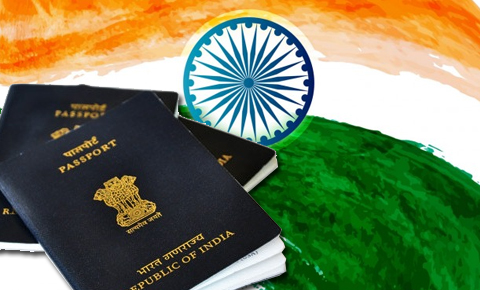MUMBAI: India's plan to introduce orange-colored passport jackets for some migrant workers is discriminatory and could increase the vulnerability of workers often duped by middlemen who promise them jobs, said legal experts and campaigners. The Ministry of External Affairs said last week migrant workers who need emigration clearance - those who have not passed 10th grade at school - to travel to a group of 18 countries, mostly in the Gulf region, would soon be issued orange passports.
"Passport holders with ECR (Emigration Check Required) status would be issued a passport with orange color passport jacket and those with non-ECR status would continue to get a blue passport," spokesman Raveesh Kumar said on Friday. Indian passports, barring official and diplomatic passports, are navy blue.
The government's plan was roundly criticized. "You cannot divide people on the basis of educational qualifications; it's discriminatory," said S Irudaya Rajan, professor at the Centre for Development Studies in Thiruvananthapuram in the southern state of Kerala, from where many migrant workers originate. "An orange cover shows a person is not well educated, and makes them vulnerable to exploitation. These are already vulnerable people who need more protection, not discrimination," he told the Thomson Reuters Foundation.
There are an estimated six million Indian migrants in the six Gulf states of Bahrain, Kuwait, Qatar, Saudi Arabia, United Arab Emirates and Oman, many of them trafficked and exploited. Many are duped by job agents, and trapped in low paying jobs with few benefits or protections. "Treating India's migrant workers like second class citizens is completely unacceptable," Rahul Gandhi, leader of the opposition Congress party, said in a tweet.
The government has not released any other details of the plan, including a timeline for implementation. "The government could argue that these passports are for the workers' protection, but to a worker it may not seem that way," said Sehjo Singh, a director at advocacy group ActionAid India. "The government must make clear how this system will work in favor of the workers."
Meanwhile, India's ambitious biometric identity project could lead to millions of people being denied access to essential services and benefits in violation of their human rights, campaigners said, ahead of key court hearings on the legitimacy of the program. India launched Aadhaar, now the world's biggest biometric database, in 2009 to streamline welfare payments and cut wastage in public spending.
The government has since made the card mandatory to access a range of services, including benefits such as state subsidies, pensions and scholarships. This "can obstruct access to several constitutional rights, including the rights of people to food, healthcare, education and social security," said Aakar Patel, executive director at Amnesty International India. "The government has a legal and moral obligation to ensure that nobody is denied their rights simply because they don't have an Aadhaar card," he said in a joint statement with Human Rights Watch (HRW) at the weekend.
Officials at the Unique Identification Authority of India (UIDAI), which oversees the program, did not respond to an e-mail seeking comment. The Supreme Court has been holding hearings on the legitimacy of the government's demand to make Aadhaar mandatory for a range of services, despite the court ruling in 2014 that the ID cannot be a requirement for welfare programs. The top court is scheduled to resume hearings on Jan 17. Campaigners and technology experts have raised concerns about privacy and the safety of the data, the susceptibility of biometrics to failure, and the misuse of data for profiling or increased surveillance.
There have been reports of biometrics failing when fingerprints have faded, and of deaths linked to denial of subsidized food when Aadhaar verification failed. Officials in Jharkhand state in October said Aadhaar was not necessary to get subsidized grains, after the death of an 11-year-old girl who campaigners say died of hunger because her family's ration card was cancelled when it was not linked to their Aadhaar card. "It is ironic that a 12-digit number aimed to end corruption and help the poor has become the very reason many have been deprived of fundamental rights," Meenakshi Ganguly, HRW's south Asia director, said in the statement. - Reuters











